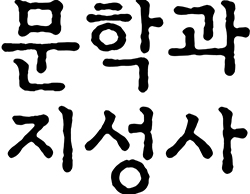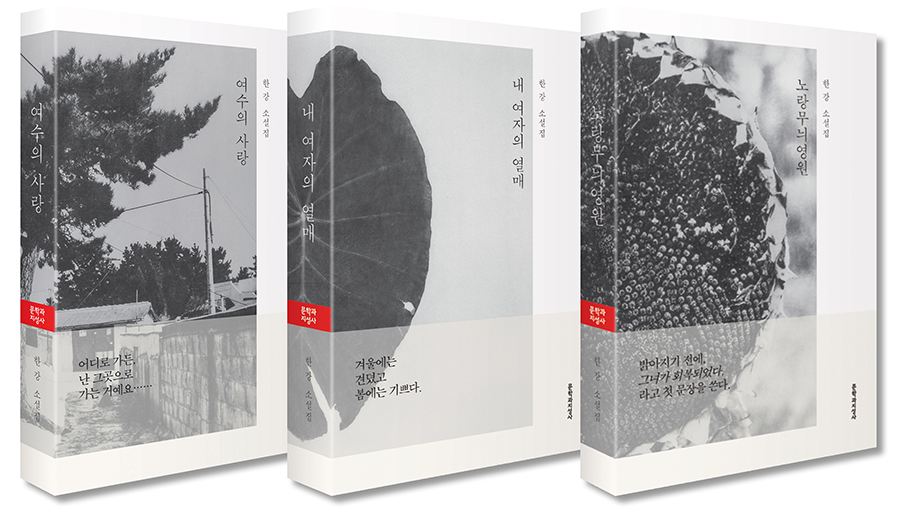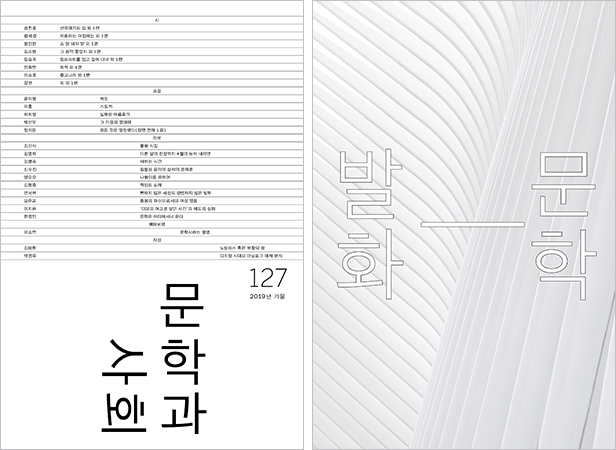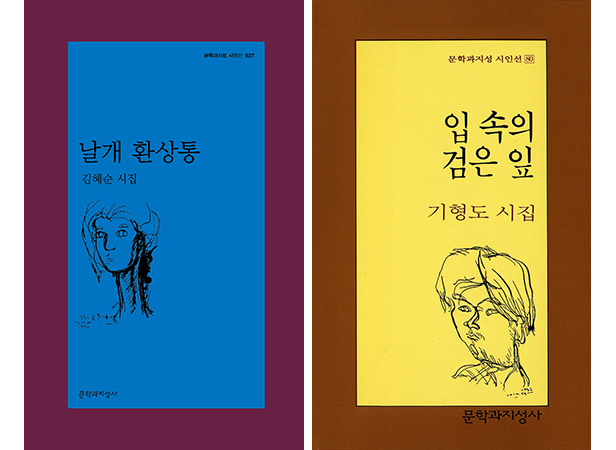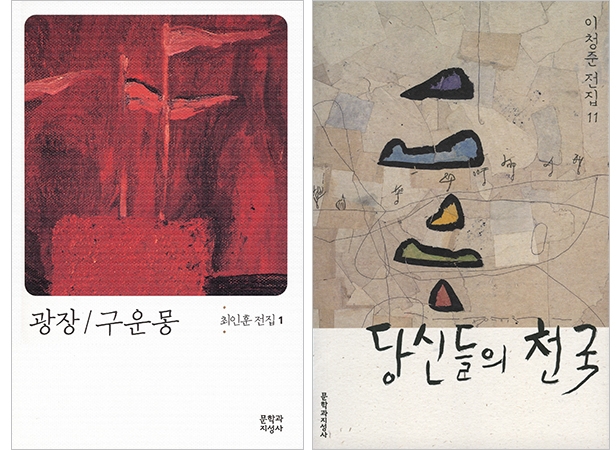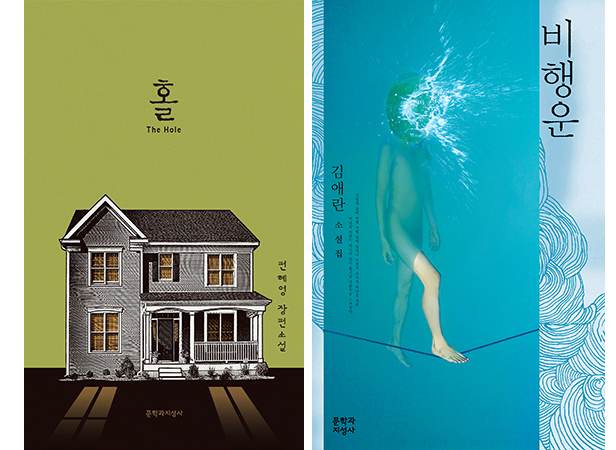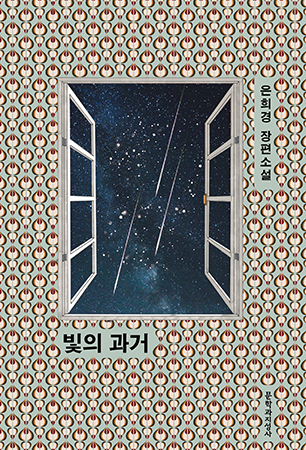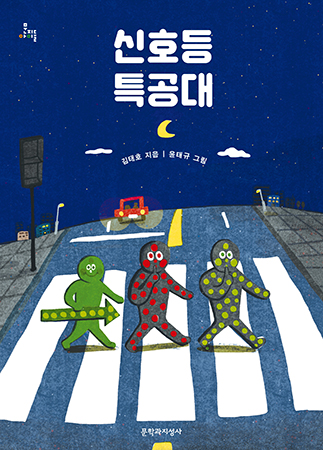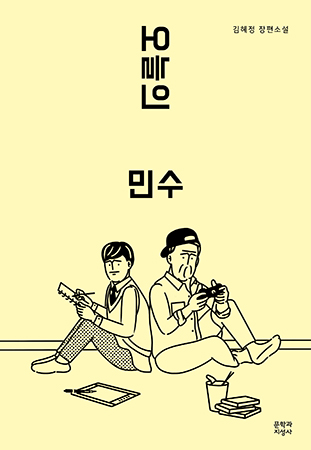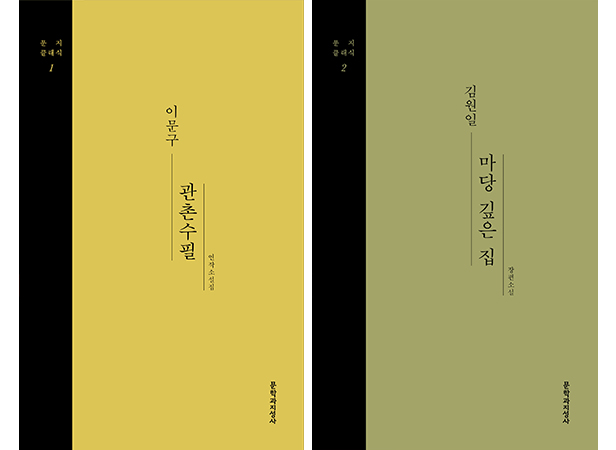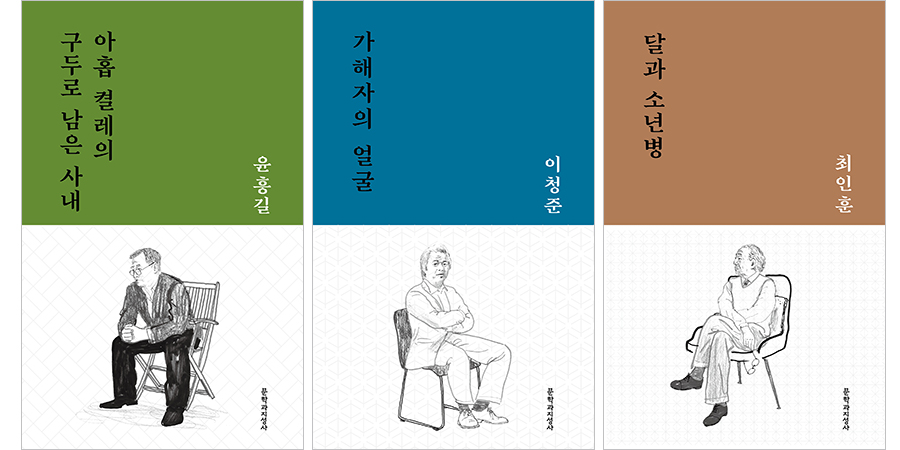|
Moonji Publishing Belongs to the Literary Community
2019.11.04
Moonji Publishing Co., Ltd is the publisher that owns the entire novel collection by Man Booker International Prize winner Han Kang. It is also the publisher of poetry collections by Kim Hye-soon, who received the Griffin Poetry Prize in Canada earlier this year. Even with just these two statements, it is easy to define Moonji Publishing as South Korea's top publisher of literature. The following looks at the treasure trove of Korean literature Moonji Publishing has and what values the publisher prioritizes when it releases books.
Moonji Publishing Co., Ltd
Please tell our readers what kind of publisher Moonji Publishing is.
Moonji Publishing is a South Korean publisher that specializes in literature and liberal arts books that was founded in 1975. For the past 45 years, we have published around 3,000 books, and most of these have been Korean poetry, novels, books of academia and liberal arts in addition to books for teens and children. We are in possession of the biggest poetry collection that exists in South Korea, which has more than 530 books, and currently we annually publish 10 to 15 new books to add to that collection. Most of Griffin Poetry Prize recipient Kim Hye-soon's poetry belongs to this collection.
Han Kang novel collection
In the case of novels, we have published a number of critical works that represent the history of Korean literature as well as novels that have received critical acclaim from outside the country. We have published three of 2016 Man Booker Prize recipient Han Kang's novels as well as some of her poetry. The Hole by Pyun Hye-young which we published received the Shirley Jackson award in 2016 and we are continuing to publish new works by Lee Seung-woo, whom French author Le Clezio has had good words for. We have not stopped in our work to find new authors and our Literature and Society award for new authors, which we have given out for over 20 years now, has made it possible for many poets, novelists and critics to make their debut. Also, through the Ma Hae Song literary award, which is in its 15th year this year, we have been discovering new fairy tale authors and publishing their work.
Moonji Publishing's values are: the freedom of literature,
Could you describe what values are most important for Moonji Publishing when releasing books?
Moonji Publishing was established by four critics and one human rights attorney with the rule that no single party would monopolize management rights. Five generations later, the company is still going strong. The company completed a reorganization last year into a co-op, showing it is carrying on the spirit of its founders that Moonji Publishing is not owned by a particular individual, but rather by the literary community. Thus, Moonji Publishing's values are: the freedom of literature, the co-ownership of literature and the respect of liberal arts-minded intelligence. A committee of experts on various topics selects our manuscripts after detailed reading, and after assessing the current times we are living in, we actively look for and plan books that we feel society needs.
Please tell us what you aim to show through your quarterly, Literature and Society.
Literature and Society
Not only is Literature and Society playing a leading role as a signpost pointing to the world we should achieve by discovering intellectual resources by digging through the mental and physical cracks in South Korean society, but it is a magazine that aims to actively accommodate literary and sociological views while retaining the independence of literature. Rather than declare our clear standing on the meaning or role of literature through the magazine, we are critically reviewing and exploring all the different social and political dynamics and relationships that surround literature. Literature doesn't just interpret society or act through different ways, but it lies within the polishing process of finding one's identity and structure which, in turn, lies inside the perspective that we all are affected by one another deeply.
Moonji Poetry Selection series is the biggest of its kind in South Korea
Moonji Publishing has released a poetry collection that has more than 500 books. What is the reason behind Moonji Publishing's painstaking efforts to publish poetry? Also, please tell our readers of any books of poetry you would like to recommend.
Moonji Poetry Selection series
Moonji Poetry Selection is created of books filled with many poets who have asked and answered essential questions about humans and life in the middle of the literary scene, which has consistently changed with the turbulent history of South Korea. It is the biggest series of its kind in the country, and we feel it deserves to be called a record of different and new senses that have evolved over time. The following books of poetry have already been translated and released abroad, so they are worth a look: Ki Hyung-do's Dark Leaf in a Mouth (available in Spanish), Kim Hyun's Glory Hole (available in English), Lee Seong-bok's Mt. Geumsan, South Sea (available in French, Japanese), Jung Hyun-jong's Whisper of Bliss (available in English), Hwang Ji-woo's One Day I'll Be Sitting in a Pub (available in Spanish).
We've heard some of your books have surpassed their 100th editions.
The Square/A Dream of Nine Clouds, This Paradise of Yours
That would be Choi In-hun's The Square/A Dream of Nine Clouds and Yi Chong-jun's novel This Paradise of Yours.
Could you tell us about some of the books that Moonji Publishing is especially proud of?
The Hole, Vapor Trail
Moonji Publishing has released many excellent works that you could say define their generation in terms of Korean literary history. There are books like the aforementioned novel by Choi In-hun which addresses the reality before and after the Korean War, in addition to works written by Yi Chong-jun and Yun Geung-gil who showed what Korean society was like in the 1970s and 1980s. We also have The Place Where the Harmonium Was by Shin Kyung-sook, who became a literary trendsetter in the 1990s, Eun Hee-kyung's Succession, Pyun Hye-young's Aoi Garden, Jeong Yi-hyun's Romantic Love and Society, Kim Ae-ran's A Pool of Saliva which all received steady love from our readers. During the past several years, Kim Ae-ran's Vapor Trail, Pyun Hye-young's The Hole, Jeong Yi-hyun's The Age of Gentle Violence all made their way to bestseller charts and Eun Hee-kyung's The Past of Light, which was published just this September, has already sold more than 30,000 copies.
Are there any books you would like to see published outside South Korea?
The Past of Light
We'd like readers to pay close attention to Eun Hee-kyung's The Past of Light which was published recently. Eun is one of South Korea's representative novelists, but this latest novel is the work of a decade for her, and through a solid plot and multi-dimensional characters, you can tell she's put much thought into it. It's a novel that details the culture and generational characteristics of South Korea in the 1970s and tells the story of differences and coming together that happens in a dormitory for young women as they meet for the first time. It can be understood by not just people who lived during that time, but by a broader audience. This is because of the experiences portrayed in the book that are being recalled and faced again by the narrator.
Can you explain to our readers what Moonji Aideul (Children) is and what some of its key works are?
Traffic Light Special Forces
Moonji Aideul was launched in 1999, and under that name, we have been publishing a diverse range of books like picture books, novels for children, poetry and classic literature to really light a fire inside children's intellect and add warmth to their hearts. Also from 2014, we have been giving out the Ma Hae-song Literary Award to recognize the work of Ma Hae-song, who opened the door to children's literature in Korea, and to support the development of children's literature in the country. Through that award, we've been trying to discover children's book authors who have potential and opening a new horizon for children's literature. We've had several bestsellers under this brand, and some of the more successful work would be Kim Tae-ho's Traffic Light Special Forces, Hwang Ji-young's Real Future and Yoo Eun-sil's My Doksan-dong.
It would be great if you could also introduce Moonji Pureunchaek (Blue Book), which focuses on teenage readers.
Today's Minsoo
Moonji Pureunchaek was planned to become a 'blue Earth' through books for teens who are growing up. We want to show them the joy of reading and the happiness of true wisdom rather than show them learning has to be a competition and knowledge is a means to achieve power. Some of that brand's key books would be coming-of-age novels like Today's Minsoo and The Islamic Butcher Shop. We have liberal arts books like The Discovery of One's Lifetime and If You Love Animals, You Become a Philosopher and translated foreign works including Vendredi, Ou La Vie Sauvage and Journey to the West.
Sometimes it feels the South Korean literary market is losing its momentum. What is Moonji Publishing's outlook on South Korea's literary market going head?
Talk of a crisis in South Korea's literary market has long existed, but Korean poetry and novels have steadily attracted readers despite the bumps in the road. Especially recently, readers took an interest in books that critically detailed the contradictions in South Korean society as they became interested in social issues like feminism and what it means to be queer. This also led to an unusual growth in book sales. And as South Korean society grows more diverse, the spectrum of South Korean literature is also expanding. Readers are increasingly selecting books that adhere to their personal taste, from avant-garde linguistic experiments to popular genres. People shouldn't say the South Korean literary market is shrinking or growing as a whole, but rather think about what books are needed in the market. And we feel it's more important we contemplate over what we should show our readers next.
It is our hope we will be able to make exchanges with many publishers
That being said, could you tell us about your plans for the future?
Moonji Classics series
Moonji Author Selection series
Moonji Publishing plans to renew its steady-sellers into a series called Moonji Classics and also expand our efforts to manage classics that are worthy of remaining as classics by releasing the Moonji Author Selection, which will put together representative works of authors who have left great marks on modern history, beyond Korean literary history. Moonji Publishing enters its 45th year next year, and we plan to introduce our best work from our wide selection at various international book fairs in hopes overseas readers will love them. It is our hope we will be able to make exchanges with many publishers and those in the international market who wish to discover excellent Korean books.
Arranged by Choi Hyo-jun
|
Pre Megazine
-

Jakkajungsin Publishing Co.
VOL.69
2024.04 -

Writer Yun Jung-Eun
VOL.69
2024.04 -

Jumping Books Publishing House
VOL.68
2024.03 -

Writer Kim Hwa-Jin
VOL.68
2024.03 -

Publisher Hyohyung
VOL.67
2024.02 -

Writer Minha
VOL.67
2024.02 -

Almond Publishing
VOL.66
2024.01 -

Writer Kwon Jung-Min
VOL.66
2024.01 -

Hakgojae Publishers
VOL.65
2023.12 -

Writer Kim Hye-Jung
VOL.65
2023.12 -

Eidos Publishing House
VOL.64
2023.11 -

Writer Hwang In-Chan
VOL.64
2023.11 -

Munhakdongne
VOL.63
2023.10 -

Writer Chang Kang-myoung
VOL.63
2023.10 -

Happywell Publishing
VOL.62
2023.09 -

Writer Baik Soulinne
VOL.62
2023.09 -

Dasan Contents Group (Dasan Books)
VOL.61
2023.08 -

Writer Lim Kyoung-Sun
VOL.61
2023.08 -

SpringSunshine Publishing Co.
VOL.60
2023.07 -

Writer Lee Kyung-Hye
VOL.60
2023.07 -

Human Cube
VOL.59
2023.06 -

Doctor Jeong Jae-Seung
VOL.59
2023.06 -

Anonbooks
VOL.58
2023.05 -

Writer Son Bo-Mi
VOL.58
2023.05 -

Namhaebomnal
VOL.57
2023.04 -

Writer Kim Bo-Young
VOL.57
2023.04 -

Hugo Publishing
VOL.56
2023.03 -

Writer Cho Kwang-Hee
VOL.56
2023.03 -

Balgeunmirae Publishing Co.
VOL.55
2023.02 -

Writer Lee Byung-Ryul
VOL.55
2023.02 -

Wisdom House, Inc
VOL.54
2023.01 -

Writer Jeong Jia
VOL.54
2023.01 -

Humanitas
VOL.53
2022.12 -

Writer Kim Yeon-Su
VOL.53
2022.12 -

Songsongbooks
VOL.52
2022.11 -

Writer Eun Hee-Kyung
VOL.52
2022.11 -

Bombom Publishing Co.
VOL.51
2022.10 -

Writer Jiwon Yu
VOL.51
2022.10 -

Hangilsa Publishing Co., Ltd.
VOL.50
2022.09 -

Writer Kim Won-Young
VOL.50
2022.09 -

Moksu Publishing Company
VOL.49
2022.08 -

Writer Yoo Sun-Kyong
VOL.49
2022.08 -

Next Wave
VOL.48
2022.07 -

Writer Park Sang-Young
VOL.48
2022.07 -

A Thousand Hopes
VOL.47
2022.06 -

Writer Bora Chung
VOL.47
2022.06 -

Woongjin ThinkBig
VOL.46
2022.05 -

Dr. Oh Eun-Young
VOL.46
2022.05 -

JECHEOLSO Publishing House
VOL.45
2022.04 -

Writer Jang Ryu-Jin
VOL.45
2022.04 -

Changbi Publishers
VOL.44
2022.03 -

Writer Kim Ho-Yeon
VOL.44
2022.03 -

Mati Books
VOL.43
2022.02 -

Writer Lee Kkoch-Nim
VOL.43
2022.02 -

Picturebook Gongjackso
VOL.42
2022.01 -

Writer Kim Sang-Wook
VOL.42
2022.01 -

Writer So-yeon Park
VOL.42
2022.01 -

Writer Yoo Eun sil
VOL.42
2022.01 -

Kungree Press
VOL.41
2021.12 -

Writer Kim Lily
VOL.41
2021.12 -

Writer Park Yeon-jun
VOL.41
2021.12 -

Writer Yi Hyeon
VOL.41
2021.12 -

A deeper world told through picture books 'Iyagikot Publishing (Story Flower)'
VOL.12
2019.06 -

Author Jeon Min-hee
VOL.12
2019.06 -

Illustrator Kim Hwan-Young
VOL.13
2019.07 -

Travelers sailing through the sea of knowledge - 'Across Publishing Group Inc.'
VOL.13
2019.07 -

Genre Novel Publisher 'Arzak Livres'
VOL.14
2019.08 -

Author Lee Yong-han
VOL.14
2019.08 -

Wookwan Sunim
VOL.15
2019.09 -

East-Asia Publishing
VOL.15
2019.09 -

Author Jo Jung-rae
VOL.16
2019.10 -

EunHaeng NaMu Publishing
VOL.16
2019.10 -

Writer Heo Kyo bum
VOL.40
2021.11 -

Writer Kim So-Young
VOL.40
2021.11 -

Author-illustrator Kim Sang Keun
VOL.40
2021.11 -

ACHIMDAL BOOKS
VOL.40
2021.11 -

Author Kang Gyeong-su
VOL.17
2019.11 -

Moonji Publishing Belongs to the Literary Community
VOL.17
2019.11 -

Author Kim Yun-jeong
VOL.18
2019.12 -

I-Seum
VOL.18
2019.12 -

Kim Cho-Yeop
VOL.19
2020.02 -

Creating a window into the future with books
VOL.19
2020.02 -

Author Serang Chung
VOL.20
2020.03 -

Hey Uhm
VOL.20
2020.03 -

Writer Lim Hong-Tek
VOL.21
2020.04 -

BIR
VOL.21
2020.04 -

Writer Song Mikyoung
VOL.39
2021.10 -

Author-illustrator Kim Dong Su
VOL.39
2021.10 -

Writer Lee Seula
VOL.39
2021.10 -

Tabi Books
VOL.39
2021.10 -

Writer Kim Soo-hyun
VOL.38
2021.09 -

Author-illustrator Lee Myoung Ae
VOL.38
2021.09 -

Writer Hwang Sunmi
VOL.38
2021.09 -

Kidari Publishing Co.
VOL.38
2021.09 -

Writer Sohn Won-Pyung
VOL.22
2020.05 -

Woods of Mind's Books
VOL.22
2020.05 -

Writer Heungeul
VOL.23
2020.06 -

Gloyeon
VOL.23
2020.06 -

Maumsanchaek
VOL.24
2020.07 -

Winners of the 2021 Bologna Ragazzi Award
VOL.37
2021.08 -

Picture book artist Lee Suzy
VOL.37
2021.08 -

Author-illustrator Yi Gee Eun
VOL.37
2021.08 -

Hubble
VOL.37
2021.08 -

Writer Baek Se-Hee
VOL.25
2020.08 -

Bearbooks Inc.
VOL.25
2020.08 -

Author Baek Hee-Na
VOL.26
2020.09 -

Yuksabipyoungsa
VOL.26
2020.09 -

Writer Kang Hwa-Gil
VOL.27
2020.10 -

Kinderland (Bandal)
VOL.27
2020.10 -

Writer Ha wann
VOL.36
2021.07 -

Author-illustrator Myung Soojung
VOL.36
2021.07 -

Writer Jung Yeo-Wool
VOL.36
2021.07 -

Publisher EcoLivres
VOL.36
2021.07 -

Writer Lee Geumi
VOL.28
2020.11 -

Sakyejul
VOL.28
2020.11 -

Writer Kim Keum-Hee
VOL.29
2020.12 -

Geulhangari
VOL.29
2020.12 -

Writer Cheon Seon-Ran
VOL.30
2021.01 -

Hyang Publishing House
VOL.30
2021.01 -

Writer Lee Hee-Young
VOL.31
2021.02 -

Sanzini
VOL.31
2021.02 -

Publisher Prunsoop
VOL.32
2021.03 -

Writer Sim Yun-Kyung
VOL.32
2021.03 -

Hanbit Media
VOL.35
2021.06 -

Hyeonamsa
VOL.33
2021.04 -

Author-illustrator Noh Inkyung
VOL.33
2021.04 -

Writer Cho Won-Jae
VOL.35
2021.06 -

Writer Kim Jung-Mi
VOL.34
2021.05 -

Safehouse Inc.
VOL.34
2021.05


